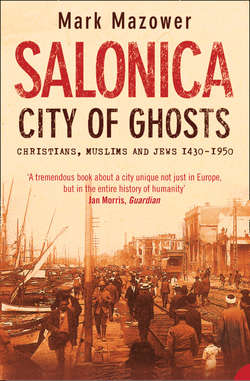Читать книгу Salonica, City of Ghosts: Christians, Muslims and Jews - Mark Mazower - Страница 17
3 The Arrival of the Sefardim
ОглавлениеWHEN EVLIYA CHELEBI, the seventeenth-century Ottoman traveller, came to describe Salonica he provided a characteristically fantastic account of its origins. The prophet Solomon – ‘may God’s blessing be upon him’ – had been showing the world to the Queen of Sheba when she looked down and saw ‘in the region of Athens, in the land of the Romans, a high spot called Bellevue’. There he built her a palace ‘whose traces are still visible’, before they moved on eastwards to Istanbul, Bursa, Baalbec and Jerusalem, building as they went, and repopulating the Earth after the Flood. Chelebi ascribes the city’s walls to the ‘philosopher Philikos’ and his son Selanik ‘after whom it is named still’. Later, he says, Jews fleeing Palestine ‘slew the Greek nation in one night and gained control of the fortress’. Hebrew kings did battle with Byzantine princesses, the Ottoman sultans eventually took over, and ‘until our own days, the city is full of Jews’.1
Evliya’s tall tale conveys one thing quite unambiguously: by the time of his visit in 1667–68, the Jews were such an integral part of Salonica that it seemed impossible to imagine they had not always been there. And indeed there had been Jews in the city before there were any Christians. In Byzantine times there were probably several hundred Greek-speaking Jewish families [or Romaniotes]; despite often severe persecution, they traded successfully across the Mediterranean, at least to judge from the correspondence found in the Cairo Genizah many years ago. Shortly before the Turkish conquest, they were joined by refugees fleeing persecution in France and Germany. Whether or not they survived the siege of 1430 is not known but any who did were moved to Constantinople by Mehmed the Conqueror to repopulate it after its capture in 1453, leaving their home-town entirely without a Jewish presence for perhaps the first time in over a millennium. This was why in the 1478 register they did not appear. But then came a new wave of anti-Jewish persecution in Christendom, and the Ottoman willingness to take advantage of this.2
